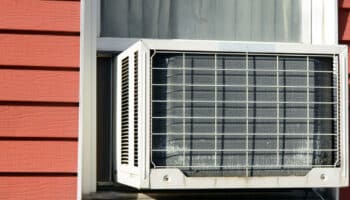Stuck trying to figure out how to quiet your noisy fridge?
Don’t worry; noisy fridges are a known issue and can be super frustrating when you have one, especially when you want to relax.
Unfortunately, noisy fridges can happen due to an unbalanced load, loose parts, and the vibration of the compressor, as well as other factors.
But the good news is that you’ve come to the right place to get the issue fixed.
If you’re trying to quiet your noisy fridge, you’ll need to level out its legs, clean it, or put it on a mat. Placing soundproofing panels behind the refrigerator, removing anything that’s on top of it, or changing its location can also solve the issue.
Keep reading to quiet your noisy refrigerator!
Why trust us? This article was written by Craig Anderson and Andy Fulenchek.
Craig has helped thousands of other homeowners repair their appliances since 2016.
Andy is one of our resident appliance repair experts with over a decade of experience. He currently runs his appliance repair company with a team of trusted technicians.
8 Ways to Quiet A Noisy Refrigerator
A faulty compressor, fan, or ice maker could be the reason your refrigerator is making noises. Sometimes, components can wear out and cause all sorts of issues.
Hopefully, by trying the following tricks, you’ll be able to figure out the problem and fix it quickly.
#1 Level Out the Refrigerator
Poor leveling could explain why you’re stuck trying to quiet a noisy refrigerator.
Your fridge is constantly running fans and its compressor to keep things cool, which means there are parts in motion almost all the time.
If your fridge isn’t level, you’ll have noise problems.
As the fans move in your fridge, they cause little vibrations. If your fridge doesn’t have all four legs firmly on the ground, the vibrations can quickly add up to a noise problem as it wiggles very slightly on its base, rattling against the floor.
Luckily, leveling out your refrigerator legs can solve the issue instantly.
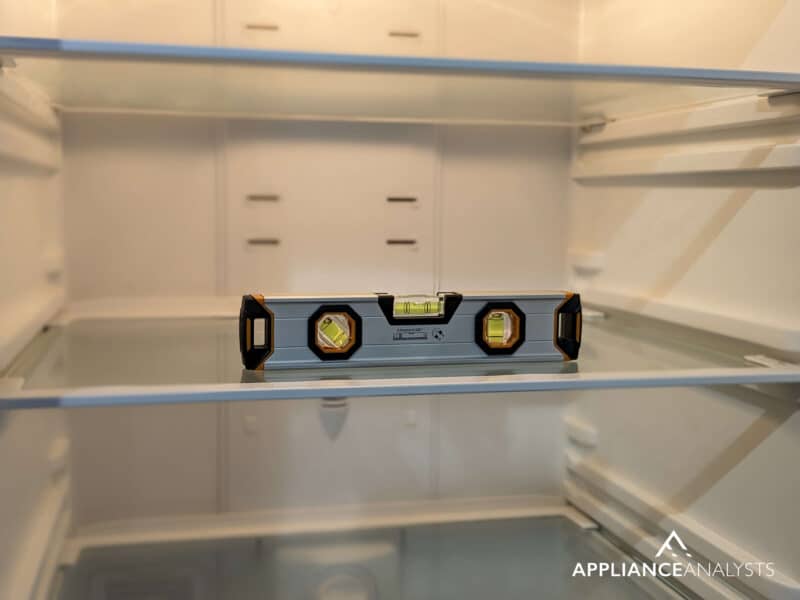
In my experience, most fridges have legs you can lengthen or shorten individually. Try rocking your fridge gently on its base, and you should be able to feel which leg is a little short.
Once you’ve spotted the bad leg, you can have a friend hold onto the fridge while you adjust the leg to the proper height.
#2 Clean the Moving Parts
Dirty fans, coils, clogged ice makers, and water valves could also explain why you’re stuck trying to quiet a noisy refrigerator.
A thorough cleaning of the inside and outside of your fridge can help with the noise.
To safely clean the abovementioned components, you should unplug the fridge first to help keep any of them from moving as you work.
Once the fridge is unplugged, you can start removing dust and debris with a damp cloth.
You should regularly clean your compressor, evaporator/condenser coils, and fans to stop excessive refrigerator noise.
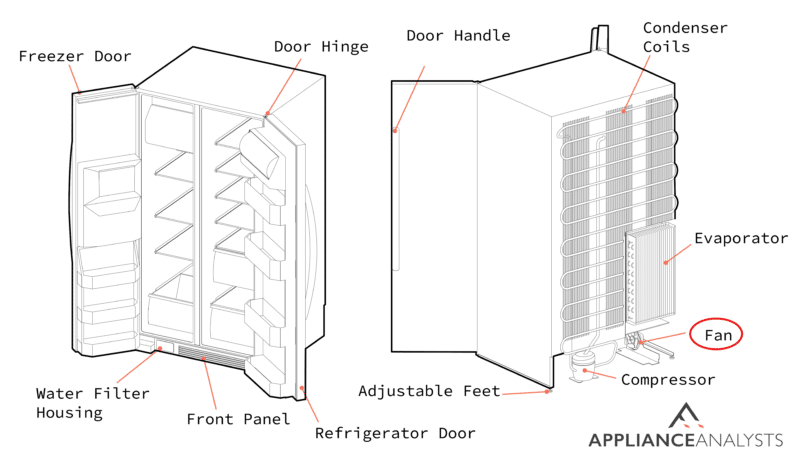
However, I find that the cleaning process can sometimes be easier said than done for a couple of reasons.
- Opening up the back of your refrigerator can be complicated if you don’t know what you’re doing.
- Opening up your refrigerator could void your warranty.
So, what should you do to clean the parts?
- Call a pro: If your refrigerator is still under warranty, you may be able to get someone to look at it free of charge.
- Check your user guide: The user guide will likely have more instructions on what to do when your compressor, coils, and fans are dirty.
To clean the ice maker, empty the ice bin and scrub it with a toothbrush. A 50/50 mix of water and vinegar is a great option for cleaning. You may also spot jammed pieces of ice that will need removal.
It’s also important that you know that each component can cause a different noise. Here’s what to listen for:
- Evaporator Fan Blade: Upon contact with ice, the fan may click.
- Condenser Fan Blade: When coming into contact with cardboard or nests, the fan may click.
- Water Valves: May cause a jackhammer sound, especially when the ice maker fills.
- Damper Doors: May cause a clicking or popping sound between the freezer and the fridge.
Determining what the noise is can go a long way in avoiding unnecessary repairs and wasted time.
#3 Use a Soundproofing Mat
Most refrigerator noises come from the vibrations of your compressor and other components. If your appliance is on a thin, laminate floor, it could explain why you’re stuck trying to quiet a noisy refrigerator.
Luckily, the problem can easily be solved by placing a soundproofing mat underneath your refrigerator.
The mat must be large enough to cover all the refrigerator’s legs to be effective. The mat will lift the refrigerator from the floor, eliminating vibrations and engulfing any background noises resulting from uneven flooring.
From what I’ve seen, soundproofing mats are available in many shapes and sizes, so you shouldn’t have difficulty finding one that fits your refrigerator perfectly. Once you’ve got your soundproofing mat, do the following:
- Remove the refrigerator from its place.
- Place the mat where you want to put the refrigerator.
- Return the refrigerator to its place. Make sure all four legs are firmly on the mat.
#4 Move the Fridge to an Alcove
If you’re still stuck trying to quiet a noisy refrigerator, try moving it elsewhere.
The fans and compressor on the back of your fridge are most likely the cause of any noise at this point. Putting your fridge somewhere with natural soundproofing will help solve the issue.
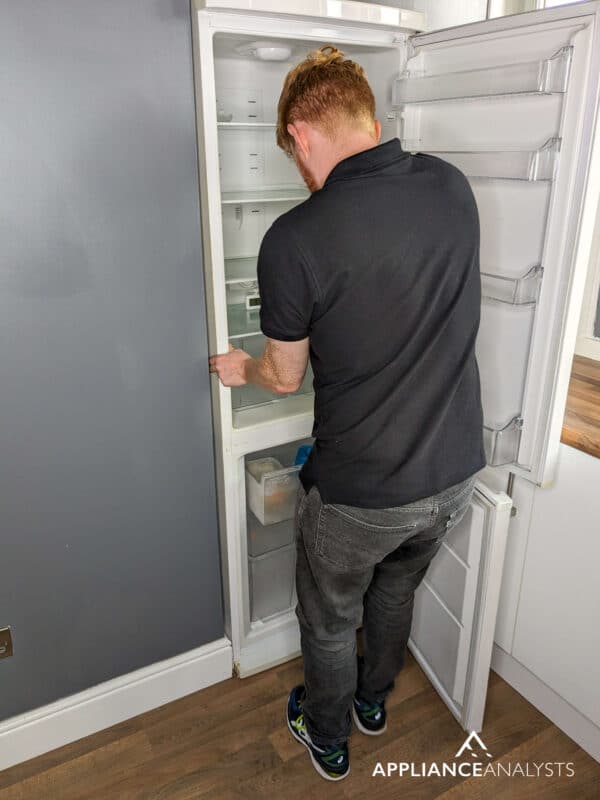
Some homes have alcoves built-in or small holes designed for an appliance to live. Putting your fridge in an alcove will help reduce noise in two ways:
- The walls next to your fridge will keep sound from escaping.
- Your fridge is probably further away from the rest of your kitchen.
The result is less noise, further from where you spend time.
#5 Soundproof Behind the Fridge
If moving your fridge isn’t an option, the final solution for quieting a noisy refrigerator is to soundproof the appliance itself. You can buy soundproofing panels that will absorb noise before it makes it to the rest of your house.
The best way to install soundproofing for your fridge is to cover the wall directly behind it. Something that absorbs noise, like textured rock wool, will keep the sound from echoing off the wall into your home.
You can also wrap textured wool around the edges of your fridge to trap even more noise. Keep in mind that covering your refrigerator with anything will warm it up, causing it to lose efficiency and likely resulting in higher electricity bills.
If you don’t mind paying a little extra every month for a quieter refrigerator, go right ahead and wrap it!
#6 Remove Items on Top of the Refrigerator
I strongly advise against putting things on top of your refrigerator.
As your fridge runs, it causes vibrations that can topple over whatever you have resting on top of it and cause considerable noise. Please relocate anything you’ve placed on top of your refrigerator and see if the noise disappears.
#7 Check the compressor
A faulty compressor is a common cause when you’re trying to quiet a noisy refrigerator.
The compressor is your fridge’s lifeblood. Without the compressor, your appliance can’t circulate refrigerant liquid and keep your food fresh.
Having your fridge’s compressor fail is not only expensive but may also be noisy. The best way to tell whether you need to repair the compressor is by looking for the following signs:
- A Grinding Noise: Typically, when something’s wrong with a fridge’s compressor, you’ll hear this type of noise.
- Constant Clicking and Erratic Operation: Either sign means your fridge’s compressor is struggling. My advice would be to get a professional to take a look.
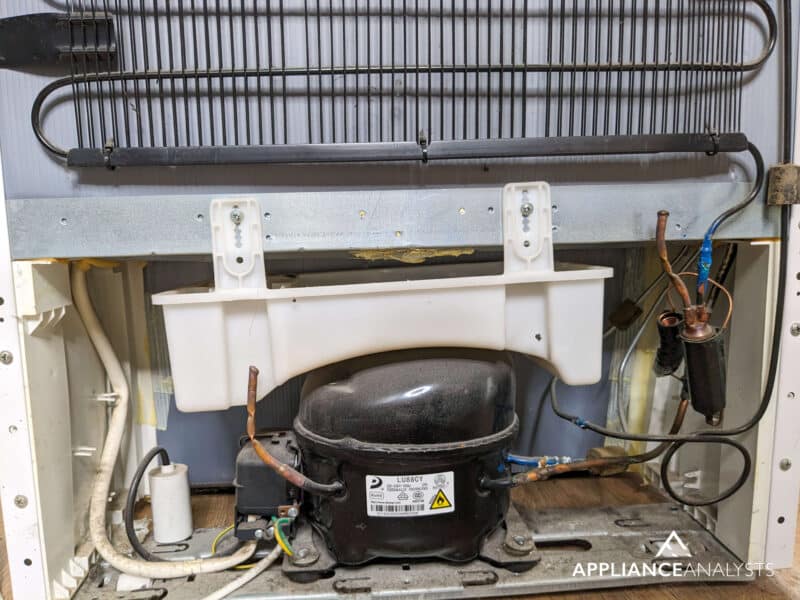
#8 Check the Control Board
The control board is your refrigerator’s brain. The board connects and communicates with all other components to regulate the appliance’s temperature, activate the compressor and get the refrigerant liquid flowing.
When there’s anything wrong with the control board, you won’t only notice that your refrigerator is acting strange or not even working but also that a very specific noise is present.
Fridge control boards have relays that help the part work and can detect when there’s an overload. When the relays fail, you’ll hear a distinctive clicking sound.
In such a case, I recommend you call a professional, as refrigerator control boards aren’t exactly simple, and I’m sure you don’t want to create additional problems.
Why Are Fridges So Loud?
You might hear three types of noise from your fridge: rattling, grinding, and whirring. Each of the noises can be very loud and have different causes.
Rattling fridges are caused by loose parts or an unbalanced load. When the compressor and fans in your fridge are running, they send vibrations through it.
Loose parts can jiggle, and the fridge itself might move back and forth. The result is a loud rattling noise that comes and goes. You can generally fix the noise by tightening the rattling parts or stabilizing the fridge.
Finding a Quiet Refrigerator
Getting a new fridge can be the best option when all else fails.
The newer the fridge, the more likely it is to be quiet. Modern fridges are almost unnoticeable when they’re running.
When you’re looking for a new fridge, keep an eye out for the following:
- Noise ratings. Many fridges are rated based on how many decibels they produce when running. The lower the decibels, the quieter the fridge.
- Quiet Operation labels. Many refrigerator brands that specifically work to make their fridges quiet will label them with “quiet operation.”
- Rubber feet and rubber insulation will help keep the noise down. The rubber will absorb any rattling or vibrations and keep noise from becoming a problem.
- Efficiency ratings. More efficient fridges are designed to use less electricity by running less often. The less often your refrigerator’s compressor kicks in, the less noise you’ll hear. In general, efficient fridges are quieter.
- Propane-run. If you’re looking for a fridge for a camper or an RV, my usual advice is to consider a propane fridge. Propane fridges run silently, and no compressor is needed. The result is a completely silent refrigerator.
Conclusion
A noisy fridge can be a constant annoyance. I hope this guide helps you get a little more peace and quiet in your daily life.
Whether you silence your current fridge or get a newer, quieter model, getting rid of fridge noise takes care of a constant source of stress.
If this article has helped you, why not support us by checking out our related articles below and subscribing to our newsletter?
Thanks for reading, have a great day!
-Craig.





